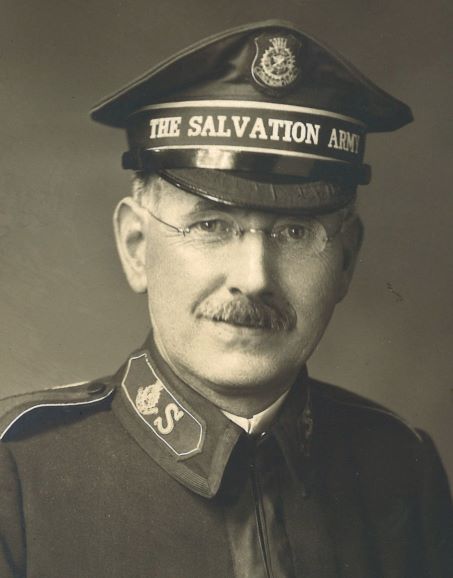COLONEL CHARLES KNOTT
It was Charlie’s younger brother who first made a decision for Christ and introduced the Salvation Army to him. He attended a service to hear his brother pray and testify and came under such deep conviction that he rushed out of the meeting. It was on a damp misty night in November in the street on his way home, that clutching an iron railing he called out to God for pardon. At the next opportunity he returned to the Army hall and went forward to the Penitent Form.
Shortly after he felt the call to officership and as a Cadet he was sent to the Training Depot at St. Alban’s. As a Field Officer, the Colonel had charge of six Corps in England and Scotland. In 1888 he was appointed to open Edinburgh II.
Captain Wilkinson entered the work one year before Charles and did splendid on The Field. They were married.
Captain and Mrs. Knott then received orders to go to Denmark with Charles as Financial and Trade Secretary with the rank of Adjutant. After completing three and a half years in that appointment, he was appointed to oversee the Training Garrison and later take a Divisional Officership.
Orders then came to return to the British Field and Staff Captain Knott was appointed to work as Divisional Secretary. A Chancellorship and a Divisional Commandership followed.
In 1905, Major Knott was chosen to go to Palestine for the purpose of investigating the possibilities of commencing Army work There. After twelve months of living in Jerusalem and traveling from Dan to Beersheba studying the land and the people, he reported back to the Founder that he felt there would-be little success in establishing a work there at that time.
Orders came to proceeds to Ceylon as Territorial Commander with the rank of Brigadier. It was during this appointment that the Brigadier was affected by malarial fever and he had to return to England to recuperate. When he got his health back, he was appointed Divisional Commander of the Canterbury Division, and after a short term there was called to International Headquarters where he filled the position of Under Secretary at the Foreign Office for eleven years.
Shortly after the outbreak of the Great War, he was selected as a Chaplain to the Egyptian Expeditionary Forces. After the war, came his appointment as Chief Secretary to Denmark with the rank of Leiut-Colonel.
On June 1, 1924 he assumed responsibilities a Chief Secretary to the Canada West Territory with the rank of Colonel.
CANADA WEST TERRITORY

Chief Secretary
ASSUMED OFFICE: June 1, 1924 to March 26, 1926
PRECEEDED BY: Colonel Frank Morris
SUCEEDED BY: Colonel Gideon Miller





